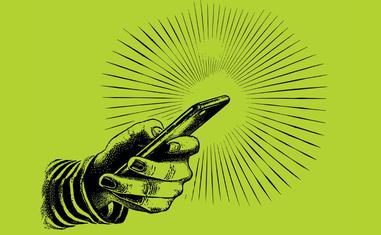The views expressed in our content reflect individual perspectives and do not represent the authoritative views of the Baha'i Faith.
The worldwide web, repository of so many things and so many misleading rabbit holes, has claimed the entire world’s attention – but can we trust it?
That network of networks, the internet, carries almost instantaneous electronic communication on our cellphones, tablets, PCs and other devices, and is now accessed by over 4.66 billion users every day.
That’s billion with a “B.” Those 4.6 billion users represent 60 per cent of all humans on the globe. We have never created a more widespread, dominant form of communication. Which brings up an important question of trust.
RELATED: Social Media Stressing You Out? Here’s How to Cope
The Baha’i teachings say that trust begins with the independent investigation of the truth. When Abdu’l-Baha explained the primary principles of the Baha’i Faith, he wrote:
The first is the independent investigation of truth; for blind imitation of the past will stunt the mind. But once every soul inquireth into truth, society will be freed from the darkness of continually repeating the past.
How can we apply this critical standard of truth and trust to the internet?
Mostly, humanity uses the web for mobile social media or ecommerce, but it has also become critical for communications, disaster preparedness, banking, education, scientific research, and even warfare.
Governmental and private sector efforts are underway to make accessibility universal, turning that 60 per cent figure to 100 per cent. Facebook has over 2.8 billion users, YouTube over 2.2 billion. Others rank high as well. One top use may be Google, with a whopping 8.5 billion searches per day.
To the internet it’s all bits, bytes, and megabytes. To us, it’s words, symbols, memes, videos, voice, email, pictures or pictographs, ads, facts, data, lies, or partial truths. The internet offers a jungle of never-stopping high-speed input to our eyes, ears, and minds, and we must sort through the cacophony for something we can rely on as true, useful, or meaningful.
For example, I have thousands of defunct files from my old PC clogging up space on my new one. I wanted to delete them en masse. I searched “delete old files” in Google and got over 38 million results in .074 seconds.
How do I determine which is true, meaningful, or helpful? How do any of us?
In this scientific and technological era, we all try to think rationally. Once the age of reason dawns, around seven years old, most of us develop a sense of what is right or wrong. We may ignore it, or, with our intelligence, seek to know more about it before acting. In addition, starting young and as we grow, we’re influenced by parents, religion, friends, culture, family, teachers, experience, what we read – and all of those influences help determine what we believe to be true or false.
In most cases, in our childhood we accept these primary influencers as true, and may not question them. We may even project, “That’s the way it is for everyone.” Not until we’ve reached our teens or early twenties do we tend to really begin examining and questioning what we’ve been taught or think we know. That’s why the young seem so open to change, why they often search for new meaning or buck the status quo.
When we see something that agrees with what we already think or know, we’re more likely to accept, believe, or trust it.
We may jump on the bandwagon and like it on Facebook, or heart it on Instagram. We might comment or share it. As human beings, we have free will. But at some point, we learn a valuable lesson: to test the source of knowledge we use to make our decisions.
In interactions with others, we hear differing opinions and views. In college or on the job, we learn about citing reliable sources and finding trustworthy references. We look for the most current information to buttress our findings. If we’re smart about it, we give informed opinions, not just opinions – we think and do our homework before spouting arguments for or against something. If our conclusions use reliable sources and prove well-thought-out and well-written, we receive top grades on our papers in school and kudos at work.
But who has time for all that when scrolling through Facebook or search results? Or looking at Instagram or any of thousands of other social media sites? What about the flood of emails we receive daily? Which ones do we open and read, or send to the trash? Which might be phishing emails, contain a hidden virus, or install malicious malware?
RELATED: Can Courtesy Help Social Media Fulfill its Promise?
Besides those people and sources we trust, another important source for the truth exists. Billions of people throughout the world believe that source is God, by whatever name you prefer to call the Creator. But God does not speak to us directly – if he did we would be dumbfounded and overwhelmed. He speaks through selected human mouthpieces or messengers, the prophets, those great spiritual teachers the Baha’i teachings call manifestations. Why? So we will know about the Creator, His love for us, and His plan to unify us as one family.
I cannot summarize the qualities of the manifestations, other than to say they are perfect human beings. Their lives are virtues put into daily practice. Christ’s qualities and virtues changed the world, as did the Buddha’s. During his lifetime, Muhammad was known as the Trusted One, and the words of all the manifestations ring truthful and honest. Those we call saints modeled their lives after them. Those we hold as great demonstrated one or more of the attributes they possessed.
Therefore, we would do well if we want to distinguish truth from falsehood by listening to what the manifestations have told us.
In a letter to a prominent Muslim cleric of his time, Baha’u’llah wrote:
Whoever gazeth this day on My signs will distinguish truth from falsehood as the sun from shadow, and will be made cognizant of the goal. God is aware and beareth Me witness that whatever hath been mentioned was for the sake of God, that haply thou mayest be the cause of the guidance of men, and mayest deliver the peoples of the world from idle fancies and vain imaginings.
In his Book of Certitude, written in response to questions put forth to him, Baha’u’llah wrote:
Meditate profoundly, that the secret of things unseen may be revealed unto you, that you may inhale the sweetness of a spiritual and imperishable fragrance, and that you may acknowledge the truth that from time immemorial even unto eternity the Almighty hath tried, and will continue to try, His servants, so that light may be distinguished from darkness, truth from falsehood, right from wrong, guidance from error, happiness from misery, and roses from thorns. Even as He hath revealed: “Do men think when they say ’We believe’ they shall be let alone and not be put to proof?”
So, we are all tested when it comes to determining the truth. Even using the internet is a test. Hopefully, we deploy our best judgment to make the decisions the web requires – and good judgment comes from knowledge or the lack of it. The Baha’i teachings give us the basis for that knowledge, by providing the most trustworthy source imaginable.

















Comments
Sign in or create an account
Continue with Facebookor